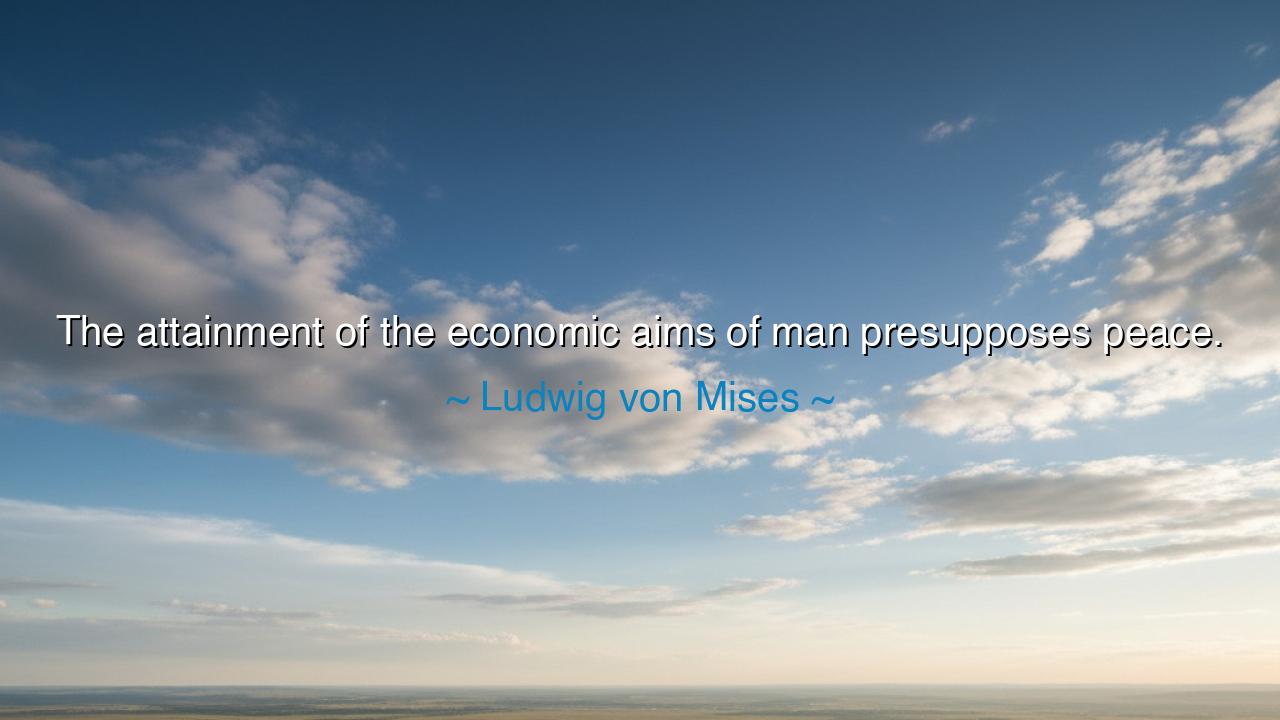
The attainment of the economic aims of man presupposes peace.






“The attainment of the economic aims of man presupposes peace.” Thus spoke Ludwig von Mises, the great economist and philosopher of liberty, and in his words lies a truth carved by centuries of toil and blood: that no wealth, no prosperity, no harvest of human labor can endure where strife reigns. For war consumes not only men but the very foundations of industry and trade. And though armies may conquer, and nations may plunder, true abundance is only possible in the shelter of peace.
When von Mises speaks of the economic aims of man, he calls to mind the universal struggle of humanity: the desire to build, to sow and reap, to exchange fairly, to provide for families, to create prosperity that endures beyond a single generation. These aims are not luxuries—they are the bedrock of civilization. Yet, he declares, they presuppose peace. For the plow cannot carve furrows when fields are burned by fire, nor can merchants trade when the roads are blocked by soldiers. Industry cannot flourish when the hammer of war falls upon the workshops of men.
History gives us countless testimonies to this wisdom. Think of ancient Rome, whose prosperity flowed not only from conquest but from the long Pax Romana—the Roman Peace—that allowed commerce, roads, and cities to flourish. For two centuries, the Mediterranean became a sea of trade, where grain, oil, and wine sustained millions. When peace fell, when legions turned upon one another, the empire’s riches withered like crops in a drought. Thus was proven: economic greatness is not the child of endless war, but of peaceful stability.
The opposite is also true. In the World Wars of the twentieth century, mighty nations poured their wealth into weapons and destruction. Fields lay barren, factories were twisted into ruins, and families starved amidst the thunder of cannons. Yet in the years of peace that followed, under the vision of rebuilding and cooperation, Europe rose from ashes into prosperity. Germany and Japan, once devastated, became economic giants—not through conquest, but through production, innovation, and the steady blessing of peace. War had drained them; peace restored them.
Von Mises’ words also warn us against a subtler truth: that prosperity without peace is an illusion. Nations that seek wealth through violence may grasp gold in the short term, but they will find it slipping through their hands like sand. Plunder cannot sustain a people. Only trust, stability, and free exchange can build wealth that endures. Just as a tree cannot grow in storm without ceasing, so too economies cannot bear fruit without the calm skies of peace.
The lesson for us is both personal and collective. If we desire success in our labor, peace must reign in our homes, our communities, our nations. Quarrels, envy, and strife may give the illusion of power, but they always destroy in the end. Peace is not idleness—it is the soil in which industry, invention, and prosperity can take root. To labor without peace is to carry water in a broken vessel; but to labor with peace is to fill jars that overflow for generations.
Practical wisdom flows from this teaching: in your own life, cultivate peace wherever you work and dwell. Do not let conflict consume the fruits of your effort. In families, seek harmony, so that children may grow strong. In communities, support fairness and justice, so that trust may endure. And in nations, demand leaders who pursue diplomacy and stability, for no riches can outlast the ruin of war. In all things, remember: peace is the foundation of prosperity.
Thus let the words of Ludwig von Mises echo as a timeless truth: “The attainment of the economic aims of man presupposes peace.” For the plow, the forge, the loom, and the market all bow to this eternal law: without peace, there is only ruin; with peace, there is abundance. May we then labor not only for wealth, but for peace itself—for it is the treasure from which all other treasures flow.






AAdministratorAdministrator
Welcome, honored guests. Please leave a comment, we will respond soon